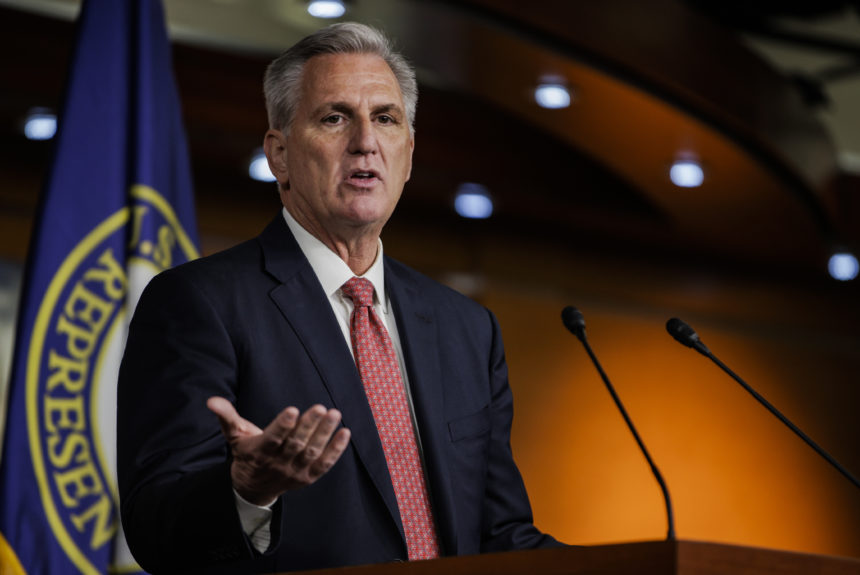Today’s release of the House Republican’s climate and energy task force blueprint represents a turning point in what will be a generational debate about who is “serious” about climate change. The plan will be rolled out in stages, but it is already clear that it is a substantial upgrade over the Green New Deal.
The plan’s release is noteworthy because House Republicans don’t need to offer a climate and energy plan. The fact that they are offering one anyway is profoundly good news and will breathe new life into the old axiom that good policy is good politics.
>>>READ: Domestic Energy Helps to Address Climate Change and Strengthen Energy Security
In his compelling piece “The GOP midterm wave is set – and Democrats can’t do anything about it,” Henry Olsen makes the case that midterm election outcomes are essentially baked in by Memorial Day.
Olsen writes, “Democrats will be thankful if they lose only 20 to 35 House seats this fall. They know they could lose as many as 40 or even 50 seats, propelling Republicans to their greatest House majority since 1928. The GOP, meanwhile, knows they can make history if they keep their heads down, nominate sane candidates and keep the focus on President Biden.”
Of course, anything is possible in politics and campaigns, but House Republicans could likely waltz into the majority by simply highlighting the many failures of Biden’s energy strategy, particularly skyrocketing gas prices, and the folly of the Green New Deal.
Yet, McCarthy and the task force want to do better than that. They aren’t content with banking on Biden’s failures and sagging poll numbers. In so doing, they seem to have learned a lesson from the GOP’s failed effort to “repeal and replace” Obamacare.
In 2007, I was working for a leading conservative health care reformer at that time, the late U.S. Senator Tom Coburn (R-OK), who was pushing the GOP to have a plan in place before the 2008 presidential primary season. The Wall Street Journal’s Kim Strassel captured the mood at that time in language that parallels today’s debate about climate and energy policy:
The important thing is that debate equals education, which equals understanding, which equals precisely what the GOP needs right now. The Heritage Foundation’s Mike Franc says Republicans are still too preoccupied with health-care small-ball–which procedures should be covered by Medicare, how much should generics cost–to get their heads around the broader subject. “This is still outside their intellectual comfort zone, and Republicans never do well in that situation,” he says. “But to win this debate–the defining issue of the next 40 or 50 years–they’re going to have to address it forcefully, head-on, and with every bit of their intellectual firepower.”
Unfortunately, in the health care debate members who were pushing for a long-term strategy never overcame the larger faction that wanted to use Obamacare’s failures to produce short-term victories. And those failures did produce short-term victories, especially in 2010. Yet, when Republicans had the political power to enact their own reforms, they couldn’t figure out what they were for.
>>>READ: An “All of the Above” Energy Strategy to Address Climate Change, Lower Energy Prices
Franc, who is an advisor to C3 Solutions, understands that for today’s Republicans, climate and energy policy also requires every bit of their intellectual firepower. Thankfully, McCarthy and the task force are helping policymakers wrap their heads around the topic and are putting real solutions squarely within their intellectual comfort zone. They are proving that policymakers can do the smart thing politically and the right thing legislatively at the same time. After all, policymakers are elected to solve problems today, not when it is politically expedient or safe. Offering a plan with real substance will help Republicans earn the trust and credibility to advance reforms when they have the political leverage to do so.
In an age of polarization, dysfunction and personality-driven psychodrama, the task force’s work is worth celebrating. It represents Congress doing what is supposed to do. The effort demonstrates the power of the underappreciated “looking forward” caucus in Congress that believes in long-term problem-solving. The plan is smart short-term and long-term politics that will help people and the planet.
The views and opinions expressed are those of the author’s and do not necessarily reflect the official policy or position of C3.
